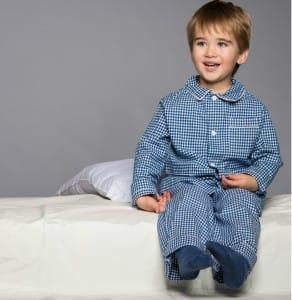
Sleep Issues and Autism Spectrum Disorders (ASD)
Written by the team in the Boone Fetter Clinic at Children’s Hospital Los Angeles.

Did you know that children with autism spectrum disorder (ASD) have more sleep-related problems than other children? Research shows that about half of school-age children with ASD have trouble sleeping, compared to about one-fourth of typically developing children. Parents of children on the autism spectrum often report sleep problems such as resistance to going to sleep or sleeping alone, waking up often or sleepwalking during the night, and being groggy in the morning.
There are many types of sleep problems, as well as other issues that can disturb sleep. Some children with ASD:
- Have trouble falling asleep at night, but sleep soundly once they fall asleep.
- May fall asleep without any difficulty, but wake often during the night and can’t get restful sleep.
- Have trouble both falling and staying asleep.
The most common problem for children on the autism spectrum is. Some children may need to be rocked, patted or have someone lie next to them before falling asleep. Others may wake up easily during the night or want to sleep somewhere else other than in bed. It is difficult for the family, because everyone wakes up tired from not sleeping well. Parents are tempted to let their children nap during the day, but this only contributes to more problems at night.
Children need to get enough sleep for health, mood and behavior. A child’s sleep problems are also stressful for parents, so it is important to find solutions that work for the family.
Create a Good Sleep Environment
The most important thing to do is develop a consistent routine around sleep, maintaining what we call good “sleep hygiene.” Sleep hygiene is about keeping a daily routine and providing an environment that promotes sleep. For example, the bed should be used only for sleeping—avoid watching TV or eating snacks in bed. Consider taking the TV and other electronics out of the bedroom. Take a look at this study, which suggests that boys with ASD get more sleep at night when they spend less time with TV and video games during the day.
A calm, supporting and consistent bedtime routine allows a child to wind down and get ready for sleep. Also, there should be a consistent wake-up time every day and limited naps for older children. The sleep schedule should be the same on weekends and school nights.
Good sleep hygiene at bed time includes:
- Dimming the lights in the evening and before bedtime
- Following a consistent bedtime routine
- Limiting TV, computers or games before bedtime
- No snacks or drinks in the bedroom
- No vigorous exercise one to two hours before bedtime
- No mentally-stimulating activity before bedtime
- Sleeping in a dark, cool and quiet room
- Using a comfortable bed and using it only for sleep
Treatments for Sleep-Related Problems
If your child with autism spectrum disorder has trouble getting a good night’s sleep, there are both behavioral and medical treatments available. Your child may need to see a sleep specialist to determine the underlying reasons for sleep problems. A common medication used for sleep disorders is melatonin, which can help to establish a healthy sleep rhythm. Make sure you discuss medications with your pediatrician or sleep specialist BEFORE trying them with your child.
At home, having a consistent bedtime ritual and the same sleep and wake-up times every day will go a long way toward helping your child and your family get a good night’s sleep. Good sleep hygiene also continues throughout the day. Make sure that your child gets out in the sunlight every day for some exercise, as daytime light can help sleep.
Good sleep hygiene during the day includes:
- Allowing exposure to sunlight for at least 30 minutes a day, preferably in the morning
- Allowing your child to take age-appropriate naps only
- Exercising regularly
- Limiting “catch-up” sleep on weekends to two hours in the morning
- Not allowing caffeine in your child’s diet
- Using techniques throughout the day to relieve stress and worry
Resources for Families
Nurse care managers in the Boone Fetter Clinic at Children’s Hospital Los Angeles are available for telephone inquiries through the free Autism Warm Line. Call 323-361-6102, Monday through Friday, 9 a.m. to 5 p.m.
Children's Hospital Los Angeles is a member of the Autism Speaks Autism Treatment Network, which offers a great resource: The Parent’s Guide to Improving Sleep in Children with Autism. The toolkitprovides strategies and suggestions based on both research and the clinical experience of sleep specialists. You can access this toolkit and other great resources by visiting autismspeaks.org/family-services/tool-kits. There are also a number of mobile apps that can help you build a good sleep routine; check out Little Star Sleep Time Story, Sleep Champ and Birdhouse for Autism to see if they work for you.


